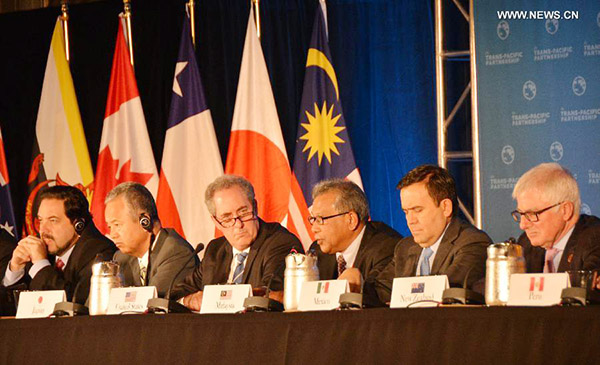Beijing not being led astray by TPP intentions
Updated: 2016-02-24 07:14
(China Daily)
|
|||||||||||
 |
|
Trade ministers of the United States and 11 other Pacific Rim countries attend a press conference after negotiating the Trans-Pacific Partnership (TPP) trade agreement in Atlanta, the United States, on Oct. 5, 2015. [Photo/Xinhua] |
From Washington to Beijing, signs of ambivalence abound in the discourse about the Trans-Pacific Partnership Agreement.
In private at least, we have heard plenty about the TPP being part of a larger plot by the United States to contain China.
With US President Barack Obama's vow that his country will not allow countries such as China to write the rules of international trade lingering in the background, it is only natural for people to consider the US-led TPP as a counter to what China is up to: such as the open and inclusive China-proposed Belt and Road Initiative, the Regional Comprehensive Economic Partnership, as well as the Association of Southeast Asian Nations-led free trade area, of which China is only one of more than a dozen potential members.
It is difficult to exclude geopolitical calculations from the TPP as some of its facilitators would surely be more than glad to kill two or more birds with one stone. But for its members, economy and trade always come first.
That is equally true for present-day China, which highly values the global market and seeks to broaden its economic and trade partnerships.
That is why we found Chinese Commerce Minister Gao Hucheng's remarks on Tuesday encouraging. "We do not see the TPP as directed against China, nor do we think it is antagonistic to the RCEP," he stated at a State Council Information Office news conference.
That may not be a direct answer to the very frequently asked, and very natural, legitimate question: How will Beijing react to the TPP?
But no further elaboration is necessary here. The reason and open-mindedness Gao displayed were a reassuring sign the authorities have not been led astray by conspiracy theories. And that will prove conducive to the region's long-term interests.
Even if some members of the TPP have extra-economic motives in creating and joining the club, the TPP is first of all a trade agreement. No matter what standards it eventually comes up with, the TPP cannot seal its members off from the rest of the world. At the end of the day, its members, many of whom are Beijing's important trading partners, cannot afford to ignore China and the rest of the global market.
Beijing, therefore, has no reason to not engage with the new trading bloc. Instead, through expanding economic and trade ties with its members, Beijing can become an indispensable partner for the TPP.
Related Stories
TPP has slight negative impact on China: US think tank 2016-02-17 11:17
China weighing up TPP, says commerce ministry 2016-02-04 13:23
With TPP signing, pact still hot button 2016-02-03 11:49
Obama backs TPP so China doesn't 'set the rules' 2016-01-13 13:34
Today's Top News
Tech giants reveal 5G innovations in Barcelona
Mechanism to be built to monitor ceasefire in Syria
London mayor says to support Brexit in EU referendum
What ends Jeb Bush's White House hopes
UK to hold EU referendum on June 23
US saber-rattling could spark arms buildup: experts
Balkan, Austria police agree to register refugees
Turkey blames Kurds, Syria for attack
Hot Topics
Lunar probe , China growth forecasts, Emission rules get tougher, China seen through 'colored lens', International board,
Editor's Picks

|

|

|

|

|

|






